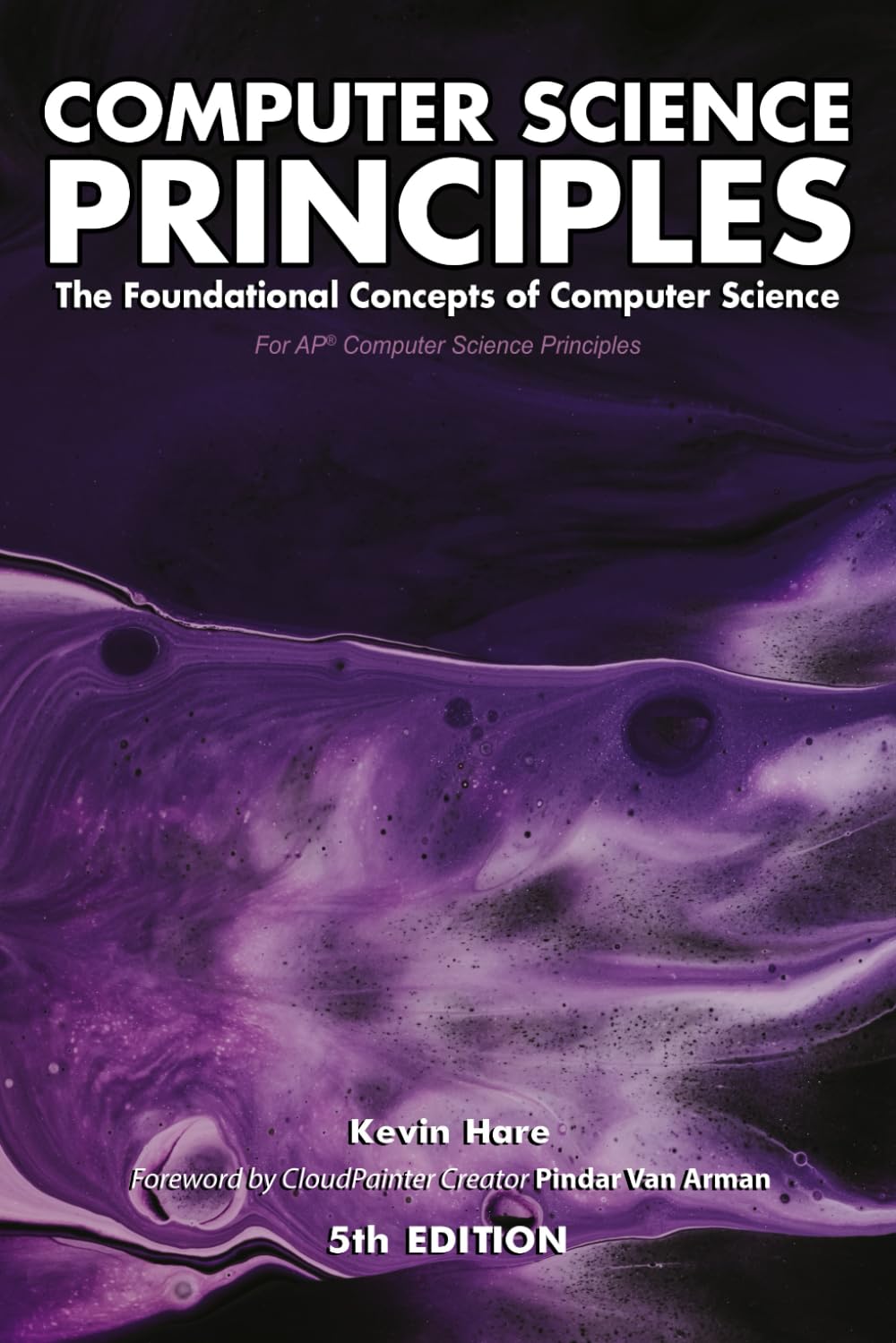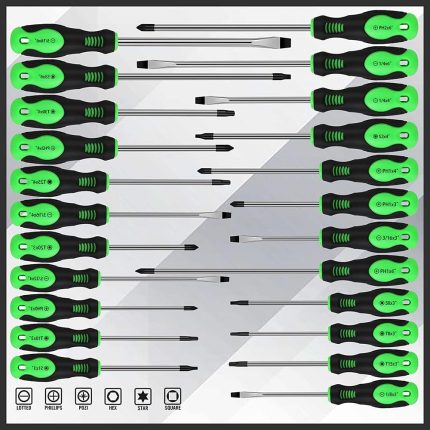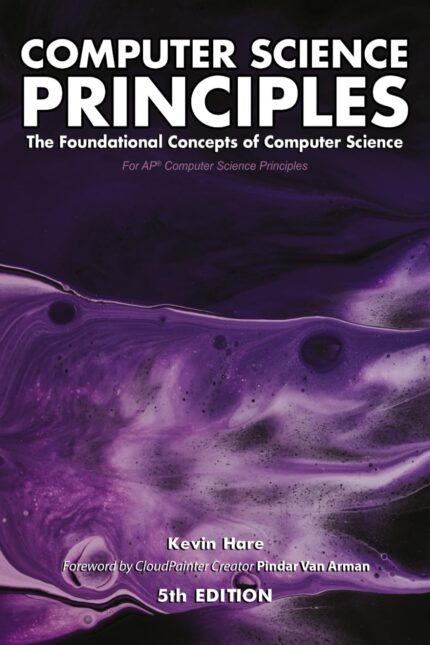5th Edition – New for 2024A great intro to Computer Science concepts for all ages. Perfect for:AP Computer Science Principles (AP-CSP)Teacher Certification Tests (PRAXIS 5652, GACE, etc.)Integrated Digital TechnologyCS FoundationsExploring Computer ScienceCurious kids and adultsEveryone!—The 5th edition comes with several updates, including:Computing SystemsDeeper dive into CPU/GPUMore on logic gateOther updatesAnd more!—
Computer science is the world’s fastest growing field of study, and this growth is showing no signs of slowing down. As a new field, computer science can seem intimidating, but it should not be scary to learn or difficult to understand. If you have ever turned on a phone or surfed the Internet then you have used a computer and should have a basic understanding of what happens when you click the mouse or touch the screen—and how fast it happens! Computer Science Principles introduces the creative side of computing. Once you’ve made your way through this book, you’ll be editing photos, designing websites, coding JavaScript, and getting organized with spreadsheets—and along the way you’ll learn the foundational concepts of computer science. How do computers convert information into ones and zeros and send it thousands of miles in a blink of the eye? What is an IP address? What do TCP/IP, DNS, HTML, and CSS stand for? How can a hard drive store large movies and thousands of songs? How can secrets be sent in plain sight? These questions—and more—are answered in Computer Science Principles.
—
Units include:
Hardware, Software, Number Systems, and Boolean ExpressionsPixels and Images
2.5. Adobe PhotoshopCompressing DataStoring Data: Spreadsheets and DatabasesProtecting Data: Heuristics, Security, and EncryptionThe InternetWeb Design: HTML and CSSProgramming: JavaScriptImpact of ComputingImportant Vocabulary
From the Publisher


A great intro to Computer Science concepts for all
Perfect for:
AP Computer Science PrinciplesTeacher Certification TestsIntegrated Digital TechnologyCurious kids and adults


The Foundational Concepts of Computer Science
As a new field, computer science can seem intimidating, but it should not be scary to learn or difficult to understand. If you have ever turned on a phone or surfed the Internet then you have used a computer and should have a basic understanding of what happens when you click the mouse or touch the screen—and how fast it happens! Computer Science Principles introduces the creative side of computing. Once you’ve made your way through this book, you’ll be editing photos, designing websites, coding JavaScript, and getting organized with spreadsheets—and along the way you’ll learn the foundational concepts of computer science. How do computers convert information into ones and zeros and send it thousands of miles in a blink of the eye? What is an IP address? What do TCP/IP, DNS, HTML, and CSS stand for? How can a hard drive store large movies and thousands of songs? How can secrets be sent in plain sight? These questions—and more—are answered in Computer Science Principles.


Hardware & Software
If you have ever turned on a phone or surfed the Internet then you have used a computer and should have a basic understanding of what happens when you click the mouse or touch the screen—and how fast it happens! A computer is an electronic device that processes data according to a set of instructions or commands, known as a program. Before creating spreadsheets, manipulating images, understanding the Internet, making websites, encrypting data, or learning how to code, it is important to understand the basics of every computer.


Web Development
Since Tim Berners-Lee first deployed HTTP in 1989—more than thirty years ago—the World Wide Web has grown to a previously unimaginable scale, and websites have gained ever greater levels of complexity. There are now many useful tools available to craft complex and aesthetically pleasing websites, including HTML (Hypertext Markup Language) and CSS (Cascading Style Sheets) editors.


Data Science
Data is everywhere. People have always collected information for multiple purposes. Data used to be relatively simple. Early humans recorded where they could find food and tracked weather patterns. With advancing technologies, however, data has become easier to collect and subsequently used for many more purposes. During the last fifty years, tracking television viewing habits has led to the current state of TV and targeted advertising. With this data, companies and advertising agencies can better target the consumers who are interested in their products. These companies save millions of dollars by not wasting money on consumers who are unlikely to buy their products while increasing sales by targeting their ads at more-likely-to-buy consumers. The existence of countless data sets creates a need for automated methods to store and retrieve information.


Security and Encryption
When it comes to using computers and networks, good security practices are no longer optional. Data breaches, distributed denial of service attacks, viruses, worms, Trojan horses, and ransomware have all been in the news in recent years. Major cities, financial firms, hospital systems, and even national militaries have all faced such attacks. Administrators of these systems have an obligation to take appropriate measures to ensure their security, but individual users should also take steps to secure their accounts by adopting best practices, such as using strong and unique passwords. Of course, the best password in the world won’t keep data secure if it is stored and transmitted in the clear. That’s where encryption comes in. Encryption can be a controversial topic, but it is essential for everything from secure online banking to private communications.


Updated for 2024!
The 5th edition updates include:
Computing SystemsDeeper dive into CPU/GPUMore on logic gateAnd more!
Publisher : Yellow Dart Publishing (January 11, 2024)
Language : English
Paperback : 283 pages
ISBN-10 : 1734554967
ISBN-13 : 978-1734554960
Item Weight : 14.7 ounces
Dimensions : 6 x 0.71 x 9 inches
Customers say
Customers find the book useful as a guide for understanding computer science. They also say it’s an easy read and understandable for most.
AI-generated from the text of customer reviews



























